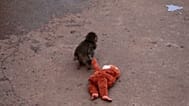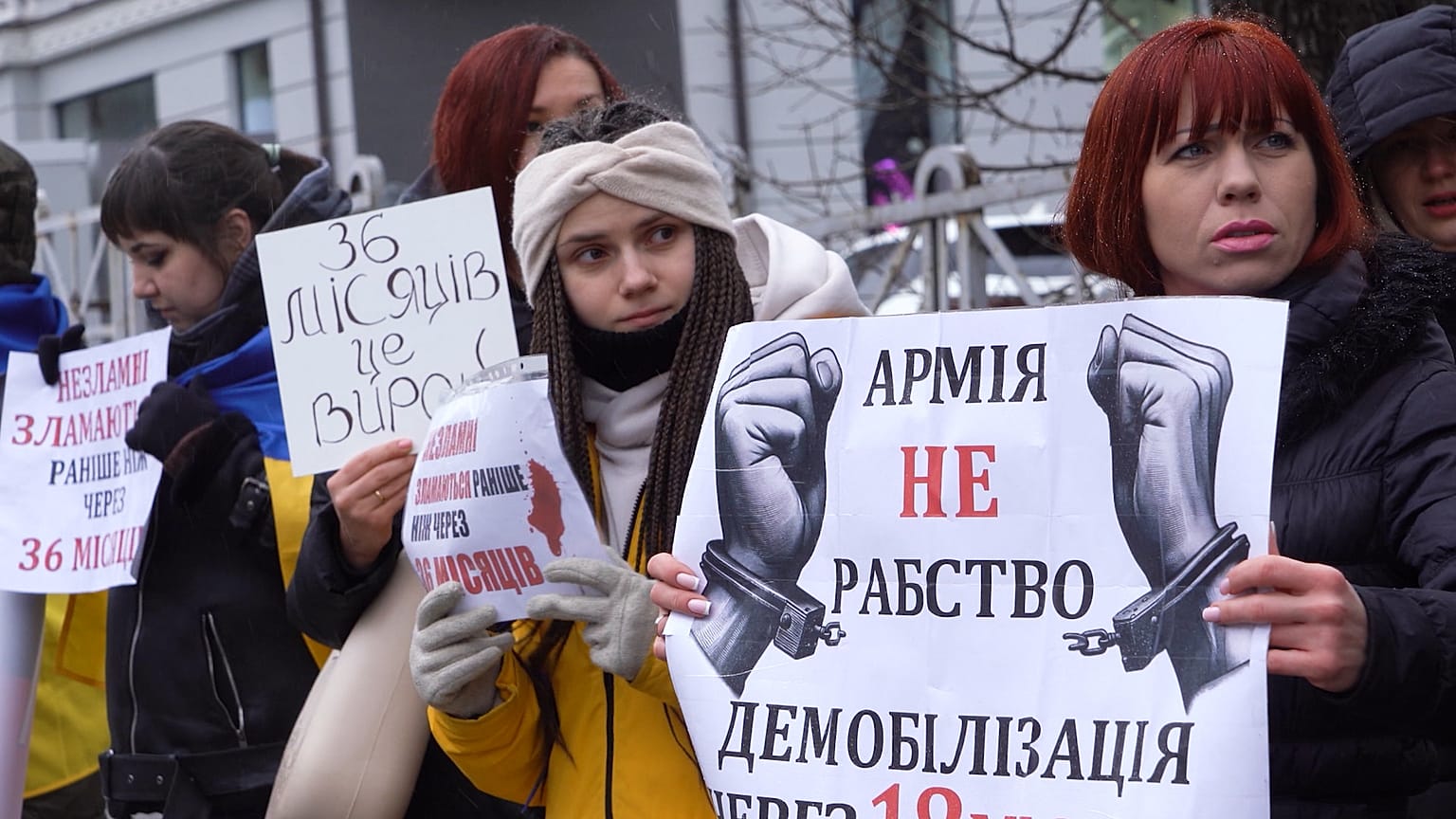Euronews Reporter Valérie Gauriat travels to Kyiv and the Donbas to see how Ukraine's population is coping with a conflict that has become part of daily life.
On a rainy day in February, Antonina Danylevich, the wife of a Ukrainian soldier and a few dozen women gathered in Kyiv to call for shorter terms of service for soldiers mobilised on the frontline since the early days of the war.
 ADVERTISEMENT
ADVERTISEMENT
 ADVERTISEMENT
ADVERTISEMENT
"My husband has been in the combat zone for two years. In all this time he only had 30 days off. Our men should be replaced, they should have time to rest. And after that, if they want to go back, then fine,” Antonina told Euronews.
Tens of thousands of Ukrainian soldiers have lost their lives since Russia's full-scale invasion of Ukraine began on 24 February 2022. More than 10,000 civilians have also died. Many expected the fighting would be shortlived, however, the conflict, now in its third year, has evolved into a war of attrition.
An absence hard-felt
Every Saturday, in a secret location on the edge of the Ukrainian capital, groups of women partake in military training sessions, under the aegis of 'Ukraine Walkyrie'.
Daryna Trebukh created the group after Russian troops withdrew from the Kyiv region in March 2022.
“After what happened in Bucha and Irpin, our women were defenceless, they were under occupation and they didn't know how to protect themselves. So I decided to start this school of survival, to teach women how to defend themselves,” she explained.
Daryna and her trainees expect a long-lasting war.
“My daughter is very interested in what I do here. She can't wait to turn 14 in a few months, this is the age she’s allowed to start military training, not with real weapons, but with strike balls for instance," explained Kateryna, a doctor who stopped to speak with Euronews after a shooting drill.
Her husband has been on the frontline for two years. "I wish it wasn't, but the war could well be part of my daughter's future”, she added.
War - a field of experimentation
Ukrainian students are also learning to adapt to the war. Many courses at the prestigious Kyiv Polytechnic Institute are now taught remotely.
However, a new ultra-secure space has been built on-site to allow students to continue their studies uninterrupted in times of war.
“In this modern shelter, students and teachers can work in a safe and comfortable way, when there are no alerts, and when there are alerts", said vice-rector Vitali Pasichnyk.
The study hub is equipped with generators, ventilation systems and resting areas and is set to be replicated in other universities across the country.
"If you don't support young students, they could leave Ukraine. You can create innovations here and build businesses. This is more than just a reaction to Russia's aggression. It's an investment in our future,” explained Pasichnyk.
Euronews observed 20-year-old student Ivan assemble a remote-controlled electronic stretcher with his peers in one of the institute's research labs. Ivan hopes it will be used to transport the wounded away from the frontline.
“It takes three or four people to carry a wounded soldier with equipment, but with this, you just place him on the stretcher and drive him away remotely,” he said.
Beyond taking part in the war effort, Ivan has plans for the future: “We are gaining skills with this project. My dream is to help develop Ukraine and create modern enterprises, to produce new and competitive things. We have huge potential,” he added.
One of the budding sectors of the future is drone manufacturing. Hundreds of drone factories have sprung up across Ukraine in the past two years.
Airlogix gave Euronews a tour of its factory, it dispatches thirty surveillance and reconnaissance drones every month.
“They allow our armed forces to fly deep into enemy lines and identify enemy equipment, such as air defence systems, electronic warfare, armoury, warehouses, and so on,” said CEO Vitalii Kolisnichenko.
“You need to be technologically advanced in this war. We consider drones to be key to our victory.”
Two years ago, Vitalii started a small cargo drone manufacturing business with around ten staff members, now he employs one hundred people. He plans to double production soon and expand to kamikaze and bomber drone manufacturing.
Thanks to support from the Ukrainian government, factories like these can avail of tax cuts and also, increase their profit margins when they take on military contracts.
“That's quite a boost for companies like ours because we reinvest. We continuously try to invent technologies that will help us gain our victory," said Kolisnichenko.
In the long run, Kolisnichenko believes drones could become a top Ukrainian export and help drive the country's economy: “I think eventually, Ukraine will become the centre of unmanned technologies, for the whole world.”
Iron will
Valérie and her team also visited the regions close to the frontline, which stretch over a thousand kilometres to the South and East of Ukraine; areas which contain much of the country's industrial infrastructure, which has been exposed to Russian bombings.
Zaporizhstal is one of Ukraine's largest steelwork companies on the outskirts of Zaporizhzhia. It became the country's leading steel and cast iron producer after the infamous Azovstal site was destroyed during the Battle of Mariupol in the first months of the full-scale invasion.
In the last two years, the factory has lost a quarter of its 10,000 employees, many joined the war effort, left for safer parts of Ukraine or travelled abroad.
The site now operates at a 70 per cent capacity and not without obstacles.
"The main type of logistics for the steel industry was sea logistics. We were forced to switch to railway transport, which is four times more expensive. And also we can’t import all the raw material we need, nor can we reach the volumes we need to sell our products,” said CEO Roman Slobodianuk.
Set some 40 kilometres away from the frontline, the factory is under constant threat. But the workers are holding on.
“I can’t avoid thinking about the dangers of war. But we are human beings, we have to live, distract ourselves, and we don’t lose hope. We work for our victory," said one employee Maksym who used to work at the Azovstal factory.
Living from one alert to another
Finding adequate forms of distraction is a challenge for children in Ukraine. An extra-curricular activity centre in Zaporizhzhia, which Euronews couldn't identify for security reasons, is providing some respite.
Valérie and her team were due to film a climbing session on site but it was interrupted just before they arrived. "There was an alert, we sent our children to the bomb shelter,” apologised Galyna, the centre’s director.
Inside the shelter, 13-year-old Veronika told Euronews: “We are used to the alerts, there are nine or ten of them a day. At the beginning of the war, I was afraid of alarms. Now I am used to them, and to shellings, to drones flying, all those things.”
After the alert, the children hurried back to their climbing session.
The organisers have adapted many of the activities to the context of war. “We are teaching the children how to travel through the mountains, navigate the terrain and provide first aid. We also teach them how to transport victims to different areas and in different conditions,” explained Svitlana Bebeshko, the head trainer at the centre.
The children soon realised their respite was short-lived when another siren began to sound, “That's how we work, from one alert to the next alert. But we're not afraid of them!” affirmed Galyna.
Euronews also met Evgeniy Tkachov, a part-time vet who spends much of his time helping people in towns and villages close to the frontline in the Donetsk region.
He brought the team to the town of Selydove, some 20 kilometres from the battlefield. Together with the aid organisation, Proliska ngo, Evgeniy distributes basic goods.
On this particular visit, he provided essential supplies and wooden panels for residents whose homes were shattered by Russian shelling the night before.
“Every day there are more and more people in need. Apart from the fact that we give humanitarian aid, we are urging people to evacuate and leave. People have spent their whole lives in these small mining towns. So, it's very hard for them to go elsewhere," Tkachov said.
"We have nowhere to go," said Inna one of the residents, whose home was damaged in the blast. "We'll rent an apartment. We hope that at least it will be quiet and that we will be able to come back here. We hope each day that it will end soon or everything will be destroyed."
Valérie finished her journey in the war-ravaged village of Predtechyne, just a dozen kilometres away from the trenches.
The majority of the 150 residents who once lived here have left for safer areas. Oleksandr is one of some twenty villagers who decided to stay, despite the proximity of the fighting and the harsh living conditions. His wife fled to a neighbouring town after their home was bombed.
Today he lives in two small rooms he managed to rebuild inside his house. Oleksandr relies on food and necessities delivered each week by volunteers. As explosions sounded in the distance, he insisted that leaving was not an option.
“This is my land. It’s my father's land, the land of my grandfather and my great-grandfather. Why should I go anywhere? No one would have stayed here if they didn’t believe that we were going to win, that the war would end with our victory.”
One Ukrainian soldier, operating in the area, paid the team an unexpected visit and gave this warning: "I’m coming from the frontline. It’s hard. The fighting is ongoing. They’re trying to capture Avdiivka. They’re coming, they’re coming!"
“War is the hardest job that ever existed in this life,” he sighed before heading off. “I’m on my way, to serve the Motherland”.
A few days later, Ukraine lost the town of Avdiivka to the Russian army.














